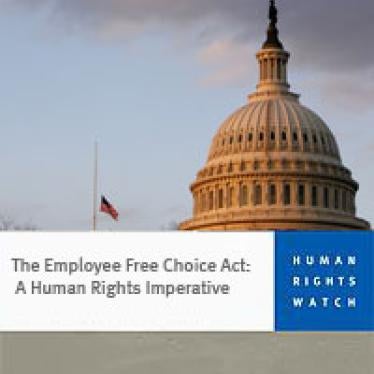(Washington, DC) - US lawmakers should back a proposed law to strengthen protections for workers who are trying to organize a union and bargain collectively, Human Rights Watch said in a report released today.
The 12-page report, "The Employee Free Choice Act: A Human Rights Imperative," details how US labor law facilitates abuses and violates international standards. Human Rights Watch has in the past extensively documented systematic interference with the right of workers to organize and bargain collectively in the United States.
"Weak US labor law effectively denies millions of workers the right to form a union and bargain collectively," said Carol Pier, senior researcher on labor rights and trade for Human Rights Watch. "Congress should bring worker protections closer to international standards by passing the Employee Free Choice Act."
A worker's right to freedom of association includes the right to organize unions and bargain collectively and is well established under international law. International norms require that workers have an effective remedy when this right is violated and that penalties for violation be strong enough to deter illegal conduct. They require employers to allow union representatives to communicate with workers and say that election procedures cannot be used to delay or prevent union formation. Once workers organize, they have the right to try to improve their working conditions through good-faith collective bargaining with their employer.
US law falls far short. Union election rules that give employers an unfair advantage impede union formation. Minimal penalties for violations fail to discourage those wishing to violate even existing rules. Endemic enforcement delays deny workers meaningful redress. And inadequate collective bargaining protections mean that, even if workers are able to organize, they may still not reach a collective agreement.
The Employee Free Choice Act, though not a cure-all, would begin to fix many of these shortcomings and bring US law closer to international standards. It would streamline the union certification process, strengthen remedies for workers whose employers retaliate against them for trying to form a union or bargain collectively, and help workers reach initial bargaining agreements with their employers.
Weak Remedies and Enforcement Delays
The Employee Free Choice Act would strengthen remedies for illegal anti-union conduct during organizing drives and initial contract negotiation. It would institute civil fines for willful or repeated illegal acts; increase the amount of money due to victimized workers; and require the National Labor Relations Board (NLRB), which is charged with enforcing US labor law, to seek injunctive relief if it believes that an employer "significantly interferes with, restrains, or coerces employees" in the exercise of their rights (as is already required in cases against unions).
US employers who violate current labor laws face no punitive penalties and few, if any, economic consequences. In most cases, they must simply complete a two-step "remediation process": restore the status quo ante by recreating working conditions prior to the violations, and post a workplace notice pledging to stop and not to repeat the unlawful conduct.
For example, an employer found guilty of firing a worker for organizing must post the "mea culpa" notice and offer to reinstate the worker with back pay, minus income earned in the interim. But most workers find other jobs during the long period while their cases are pending and do not want their old ones back. An employer guilty of making anti-union threats or of readjusting security cameras to spy on union supporters must simply hang the requisite notice and stop the illegal conduct.
"Employers violate workers' rights knowing they'll face minimal consequences," said Pier. "This bill could finally make them think twice before breaking the law."
Unfair Union Election Procedures
Under the Employee Free Choice Act, workers would choose between two options for exercising their right to organize: a "card check" - freely signed authorizations by a majority of workers indicating their desire to organize - and an NLRB-run election. As long as the NLRB authorized the card-check results, employers would have to accept them and recognize the union.
US employers can currently refuse to recognize a union based on a card check. Employers can demand instead that majority support be shown through an NLRB election. The pre-election period creates an opening for anti-union employers to exploit a tilted playing field with distorted anti-union campaigns or unlawful anti-union activity.
Biased US union election rules presently allow employers to campaign vigorously against union formation and to deny union organizers a similar opportunity to respond. Employers can force workers to attend anti-union captive-audience meetings during work time and prohibit union advocates from holding parallel meetings. Employers can issue a steady anti-union drumbeat during the workday while barring union organizers from the workplace. And in most cases, employers can prevent union representatives from distributing information on company premises, including sidewalks and parking lots.
"Union elections are rife with employer coercion and mock the notion of fair, democratic voting," said Pier. "The Employee Free Choice Act would dramatically increase workers' chance of freely exercising their right to organize."
Bad-Faith Collective Bargaining
The Employee Free Choice Act would also provide some relief for the thousands of US workers stuck in first-contract negotiations with employers bargaining in bad faith. It would allow such workers to seek mediation and then arbitration leading to a binding contract.
Under the current law, even if workers successfully organize, they are often denied a collective agreement. If a US employer is found guilty of illegal "surface bargaining" - negotiating with no desire to reach a contract - the remedy is simply to return to bargaining, where bad-faith negotiating can begin again. Many disheartened workers abandon this futile process and their union, driven by their employers to surrender their right to freedom of association.
"With the Employee Free Choice Act, workers could finally escape the endless cycle of bad-faith bargaining and exercise their right to negotiate," said Pier.







